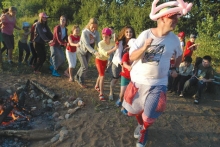INCREASING THE FLOW OF CAPITAL FOR GOOD - INVESTING AND GIVING

Today, in contrast, donations by the largest Russian companies amount to over $2.5 billion a year, and the country has over 40 well resourced private foundations, established by the wealthiest families. Middle class giving that had not existed even five-to-six years ago, produces over $20m a year in ‘registered’ charitable giving (the true amount is likely much higher). Meanwhile, more than 30 Russian community foundations created since 1995 receive most of their funding from local donors.
Yet, there are numerous challenges to this historic growth of private and corporate giving that Russia experiences today.
Corporate giving represents over 60% of all domestic philanthropy (in comparison with just under 10% in the US), but is tightly bound by regional obligations which companies have inherited from the Soviet past. In the Soviet Union entire cities were built in previously uninhabited areas of Siberia and the North around a particular factory or a plant where the entire community infrastructure depended on and was funded by that individual industry. Today privatised enterprises struggle to cope with past and present social obligations, and as a result from 40% to sometimes 80% of corporate donations are tightly linked to specific towns and communities surrounding companies production sites, thus making corporate giving less accessible to the wider charitable sector.
Private giving by high-net-worth (HNW) individuals meanwhile meets with yet another set of challenges. On one hand, by now the majority of so called Russian ‘oligarchs’ have private foundations, most providing significant resources to support education, culture and the arts, as well as social needs.
On the other hand, the majority of newly wealthy donors struggle to identify a long-term mission in their giving; they aspire to embrace strategic philanthropy but are still looking for effective ways to do that in specific Russian circumstances. Both the Russian Donors Forum, a growing membership network of donors, and CAF Russia help private donors ‘to find themselves’ in their private giving and make HNW philanthropy more effective and accountable, but a lot still needs to be done.
Finally, middle class giving, while it has grown significantly in the past five years – from virtually zero to hundreds of millions of roubles in 2007 – by and large ‘passes by’ registered charities. The level of suspicion and distrust towards the voluntary sector is very high in Russia due to some scandals of mid-1990s, and the majority (80%) of middle class donors prefer to give directly to individuals, for example, in the form of paying for treatment of a seriously ill child, or donating funds to government institutions such as schools or orphanages.
Philanthropy in Russia has grown considerably in the past few years. But this historic ‘big leap forward’ needs to be supported by more long-term but nevertheless much needed work. First and foremost, the Russian civil society sector and Russian donors should make an effort to influence the restrictive and discriminatory regulation system of charities and non-profit organisations created in recent years by the Putin Government.
Russian donors, with the support of membership and intermediary organisations, should also develop a dialogue with the wider charitable sector and make their funds more accessible to Russian NGOs, which struggle to raise funds and sustain their often much more effective and innovative programmes.
Finally, emerging Russian philanthropists, including especially HNW donors, should focus more on making an impact with their giving as well as the responsibility that they take when entering the philanthropic field, so that this incredible growth in giving does not become just another luxury toy of famous oligarchs, but delivers real change in this challenging country.
Olga Alexeeva is Head of CAF Global Trustees, a division of CAF (Charities Aid Foundation) that is focused on the development of private and family giving around in the world. She works directly with a number of ultra high-net-worth individuals from Russia, Ukraine, Brazil, India and China to assist in the development of private philanthropic projects and foundations. www.cafonline.org.






